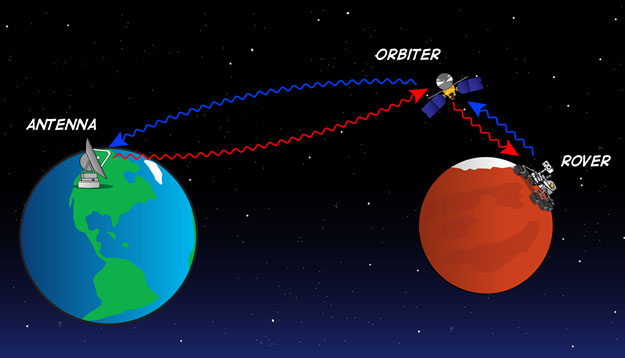By Teagan Wall
With cell phones and the internet, we’re used to communicating with anyone, anywhere, quickly and easily. But how do scientists communicate with things that aren’t on our planet—such as the Curiosity rover on Mars? This communication beyond Earth is a bit more complicated.
We communicate with spacecraft using radio signals. Radio signals move at the speed of light. However, they have a long way to travel. Even when it is closest to Earth, Mars is still about 35 million miles away. And sometimes it’s much, much farther! If you sent a text message to Mars, it would take, on average, about 14 minutes for it to get there.
This long distance makes talking with robots on other planets difficult. Imagine driving in a video game and waiting 28 minutes to see your car make a turn! It would take forever to drive the rover one turn at a time. Instead, we send Curiosity all the instructions for the day at once. Most of the rover’s daily tasks—like taking photographs and zapping rocks—are planned out in advance.
Some days we can’t directly talk to the rovers. We use antennas to send and receive signals, but Mars and Earth are both constantly spinning. On Earth, the antennas are located around the world so that at least one is always facing Mars. About half of the time, though, Curiosity’s location on Mars is not facing toward Earth. During these times, Curiosity can’t send signals directly to our antennas.
So how does the rover send its messages to Earth? Through an orbiter!

Orbiters are special spacecraft that spend their time continuously traveling around an object, such as a moon or a planet. There are several orbiters traveling around Mars. When Curiosity isn’t facing Earth, it can send a message to one of these orbiters. Then, once the orbiter reaches the Earth-facing side of Mars, it sends the signal.
Each day, Curiosity sends information to at least one Mars orbiter, and the orbiter sends that information to Earth. Hurray for teamwork!
